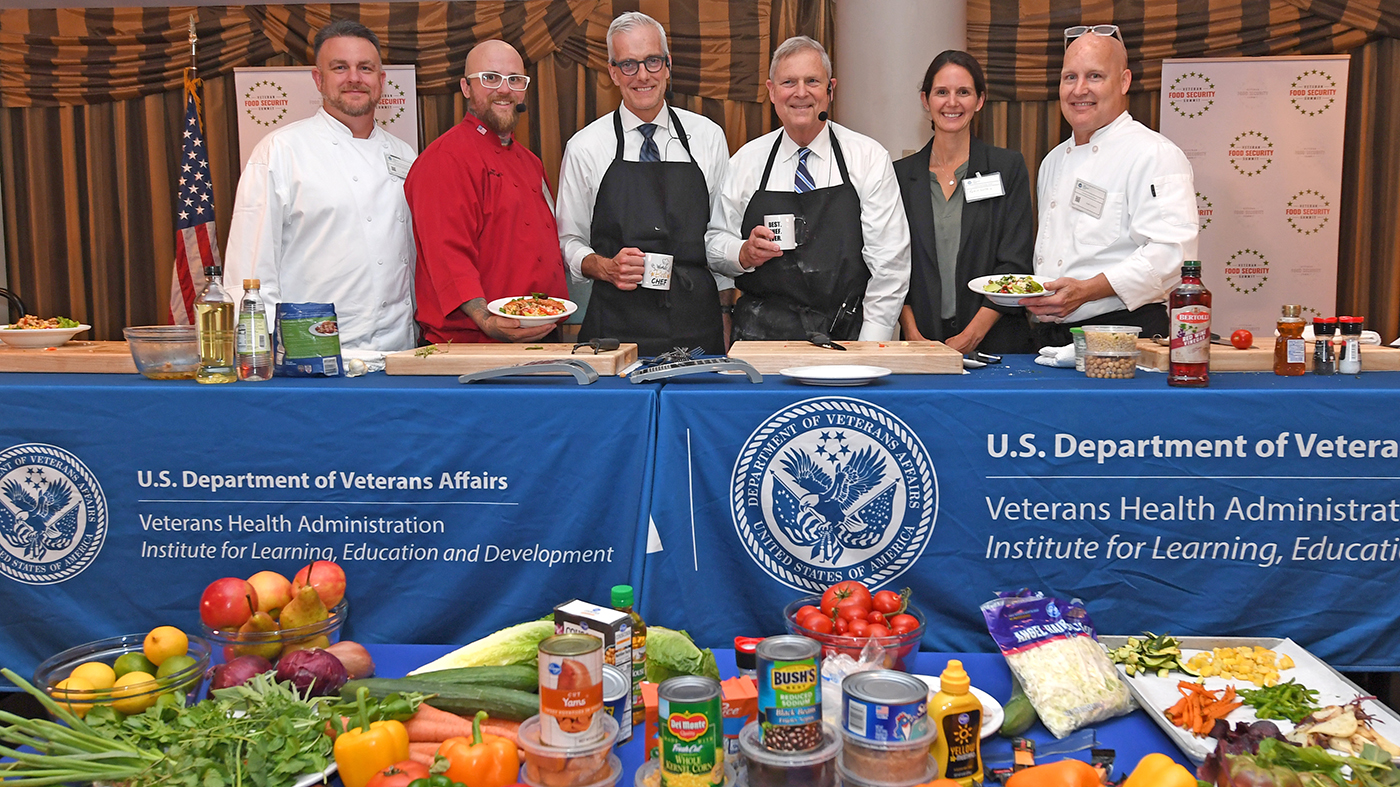Food insecurity affects nearly 34 million people in the U.S., with Veterans being 7% more likely to experience it than non-Veterans. VA recently hosted the 2024 Veteran Food Security Summit in Crystal City, Virginia, bringing together stakeholders, policymakers and advocates to tackle food insecurity among Veterans.
The first day of the summit concluded with a cooking competition between VA Secretary Dennis McDonough and USDA Secretary Tom Vilsack. McDonough highlighted the importance of VA’s partnership with USDA and other partners.
“USDA plays a central role in so many communities across the country, and I’ve come to appreciate more profoundly just how much investment USDA and the American taxpayer makes in federal, rural communities across the country. I think VA shares a mission with USDA, especially in rural communities across the country, because our Veterans are more likely to be from rural settings.”
Veterans face unique challenges that make them more susceptible to food insecurity than the general population. VA knows understanding these factors is critical to developing collaborative strategies to support Veterans effectively.
The summit theme is the idea that we are “better together,” emphasized Dr. Thomas O’Toole, deputy assistant under secretary for Health for Clinical Services. “It’s not just for our nutrition and food service experts to solve this problem. It’s social workers and physicians, nurses, techs and anyone else in the care team who can identify a Veteran in need and refer them to the place that can best help them,” O’Toole said.
VA’s role in ending food insecurity
“VA has been screening for food insecurity since 2017, but until last fall screenings were only required during primary care visits,” said Dr. Christine Going, senior advisor, VHA Food Security Office. “Since not all Veterans use primary care, we have also begun screening inpatients, significantly increasing the number of Veterans being asked for this important information.”
“Since this time last year, we have successfully screened over 1.5 million more Veterans for food insecurity compared to the previous year” said O’Toole. “There are various reasons for this, one of which is the inclusion of food insecurity screening in our inpatient nursing assessment. As a result, we have seen a remarkable 565% increase in the number of Veterans agreeing to referrals with a VA-registered dietitian and a 40% increase in referrals to a social worker.”
VA is implementing a number of programs to increase food security among Veterans, such as Food is Medicine Initiatives, VA Food Hub Pilot Program, Nutrition Counseling and Healthy Teaching Kitchen. Facilities across the country are standing up interdisciplinary committees and using new data dashboards that help each VA serve the Veterans in their community.
Partnerships, community engagement and collaboration
The summit aligned with the whole-of-government approach to fulfilling the White House’s commitment to the National Strategy to End Hunger by 2030.
“Partnerships help VA expand its reach and innovation, providing vital resources for Veteran food security programs and initiatives. Collaborations like the VA-USDA partnership offer educational seminars and research opportunities to improve nutrition care and policy insights,” said Going.
With monthly community of practice calls involving around 200 participants, VA’s Food Security Office (FSO) is actively promoting collaboration among VA facilities, sharing lessons learned and best practices.
FSO also works closely with USDA to augment VA’s food security efforts. “Here’s a nutrition assistance program called SNAP (Supplemental Nutrition Assistance Program) and here’s how Veteran families can apply for and qualify for SNAP so that they’re in a position to enjoy a broader array of food,” said Vilsack.
For resources and to learn more about how VA is working to end Veteran food insecurity, visit VA Nutrition and Food Insecurity.
Topics in this story
Link Disclaimer
This page includes links to other websites outside our control and jurisdiction. VA is not responsible for the privacy practices or the content of non-VA Web sites. We encourage you to review the privacy policy or terms and conditions of those sites to fully understand what information is collected and how it is used.
More Stories
Bob Jesse Award celebrates the achievements of a VA employee and a team or department that exemplifies innovative practices within VA.
The Medical Foster Home program offers Veterans an alternative to nursing homes.
Watch the Under Secretary for Health and a panel of experts discuss VA Health Connect tele-emergency care.







How do you help with food insecurity ?
Just being totally Honest, If it were not for VA & our Benefits, there are a lot of us that would Definitely be in a Homeless or Food insecurity situation(Thank God) for everything that VA does & the many Programs for my Family & all of my Brothers and Sisters…Thank You VA for ALL THAT YOU DO FOR ALL
Just being brutally honest, if the Va would stop denying deserving vets their compensation claims then just maybe we wouldn’t be starving and homeless…